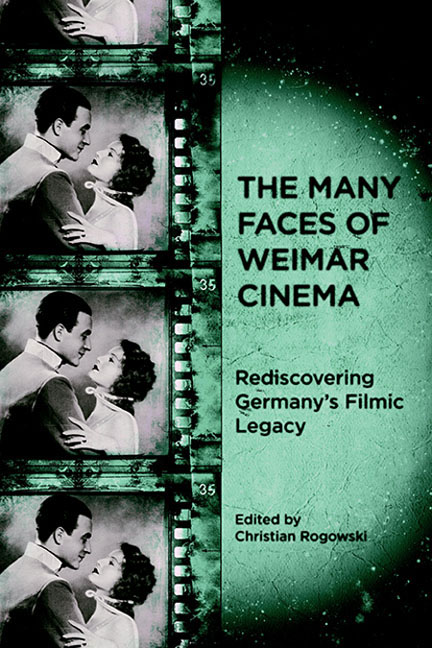Book contents
- Frontmatter
- Contents
- List of Illustrations
- Preface
- Introduction: Images and Imaginaries
- 1 Richard Oswald and the Social Hygiene Film: Promoting Public Health or Promiscuity?
- 2 Unsettling Nerves: Investigating War Trauma in Robert Reinert's Nerven (1919)
- 3 Humanity Unleashed: Anti-Bolshevism as Popular Culture in Early Weimar Cinema
- 4 Desire versus Despotism: The Politics of Sumurun (1920), Ernst Lubitsch's “Oriental” Fantasy
- 5 Romeo with Sidelocks: Jewish-Gentile Romance in E. A. Dupont's Das alte Gesetz (1923) and Other Early Weimar Assimilation Films
- 6 “These Hands Are Not My Hands”: War Trauma and Masculinity in Crisis in Robert Wiene's Orlacs Hände (1924)
- 7 The Star System in Weimar Cinema
- 8 Schaulust: Sexuality and Trauma in Conrad Veidt's Masculine Masquerades
- 9 The Musical Promise of Abstract Film
- 10 The International Project of National(ist) Film: Franz Osten in India
- 11 The Body in Time: Wilhelm Prager's Wege zu Kraft und Schönheit (1925)
- 12 Henrik Galeen's Alraune (1927): The Vamp and The Root of Horror
- 13 The Dialectic of (Sexual) Enlightenment: Wilhelm Dieterle's Geschlecht in Fesseln (1928)
- 14 Babel's Business — On Ufa's Multiple Language Film Versions, 1929–1933
- 15 “A New Era of Peace and Understanding”: The Integration of Sound Film into German Popular Cinema, 1929–1932
- 16 Landscapes of Death: Space and the Mobilization Genre in G. W. Pabst's Westfront 1918 (1930)
- 17 Undermining Babel: Victor Trivas's Niemandsland (1931)
- 18 Unmasking Brigitte Helm and Marlene Dietrich: The Vamp in German Romantic Comedies (1930–33)
- Filmography
- Notes on the Contributors
- Index
13 - The Dialectic of (Sexual) Enlightenment: Wilhelm Dieterle's Geschlecht in Fesseln (1928)
Published online by Cambridge University Press: 29 April 2017
- Frontmatter
- Contents
- List of Illustrations
- Preface
- Introduction: Images and Imaginaries
- 1 Richard Oswald and the Social Hygiene Film: Promoting Public Health or Promiscuity?
- 2 Unsettling Nerves: Investigating War Trauma in Robert Reinert's Nerven (1919)
- 3 Humanity Unleashed: Anti-Bolshevism as Popular Culture in Early Weimar Cinema
- 4 Desire versus Despotism: The Politics of Sumurun (1920), Ernst Lubitsch's “Oriental” Fantasy
- 5 Romeo with Sidelocks: Jewish-Gentile Romance in E. A. Dupont's Das alte Gesetz (1923) and Other Early Weimar Assimilation Films
- 6 “These Hands Are Not My Hands”: War Trauma and Masculinity in Crisis in Robert Wiene's Orlacs Hände (1924)
- 7 The Star System in Weimar Cinema
- 8 Schaulust: Sexuality and Trauma in Conrad Veidt's Masculine Masquerades
- 9 The Musical Promise of Abstract Film
- 10 The International Project of National(ist) Film: Franz Osten in India
- 11 The Body in Time: Wilhelm Prager's Wege zu Kraft und Schönheit (1925)
- 12 Henrik Galeen's Alraune (1927): The Vamp and The Root of Horror
- 13 The Dialectic of (Sexual) Enlightenment: Wilhelm Dieterle's Geschlecht in Fesseln (1928)
- 14 Babel's Business — On Ufa's Multiple Language Film Versions, 1929–1933
- 15 “A New Era of Peace and Understanding”: The Integration of Sound Film into German Popular Cinema, 1929–1932
- 16 Landscapes of Death: Space and the Mobilization Genre in G. W. Pabst's Westfront 1918 (1930)
- 17 Undermining Babel: Victor Trivas's Niemandsland (1931)
- 18 Unmasking Brigitte Helm and Marlene Dietrich: The Vamp in German Romantic Comedies (1930–33)
- Filmography
- Notes on the Contributors
- Index
Summary
In late November 1928, Berlin newspapers reported strange goings-on in some of the city's grimiest neighborhoods: in the working-class districts in the north people were surprised to find letters in their mailboxes marked, “Streng vertraulich” (Strictly Confidential). Likewise, passers-by on Müllerstraße in the district of Wedding were handed sealed envelopes with the imprint, “Nur öffnen, wenn Sie allein sind” (To be opened only when you are alone). What was the secret that ostensibly needed to be carefully guarded, yet shared with “almost everybody whose name appears in the address book?” Those adventurous enough to open these envelopes found that they contained an ad for a film with the titillating title, Geschlecht in Fesseln (Fettered Sexuality, or Sex in Chains) that was to be shown in a local movie theater. The title and the aura of secrecy surrounding the film may very well have created the impression that what was advertised was a pornographic film catering to the more unusual sexual tastes. The whole thing, it turned out, was a clever publicity stunt devised by the owner of a local cinema, eager to exploit people's penchant for secrecy and to capitalize on the title of a film that seemed to cater to prurient desires.
Such lowbrow advertising tactics were a far cry from the official publicity surrounding Wilhelm Dieterle's film a month earlier when it opened, on 24 October 1928, at the prestigious Tauentzienpalast in Berlin's affluent West End. The official program brochure oozes high-minded seriousness: the plot summary of the film is preceded by a quote from the beginning of the Third Canto of Dante's Inferno, when Dante and his guide Virgil pass through the gates of hell: “Through me the way into the suffering city/Through me the way to the eternal pain/Through me the way that runs among the lost.” The quote is followed by the somewhat pompous admonition that “Dante's words ought to shine (“glühen”) on the main portal of every prison.” On a more somber note, the film's subtitle, Die Sexualnot der Gefangenen (The Sexual Distress of Prisoners) highlights an explicit political agenda: Geschlecht in Fesseln presents itself as an intervention in debates concerning prison reform, based on the notion that sexuality constitutes a basic human right.
- Type
- Chapter
- Information
- The Many Faces of Weimar CinemaRediscovering Germany's Filmic Legacy, pp. 211 - 234Publisher: Boydell & BrewerPrint publication year: 2010



